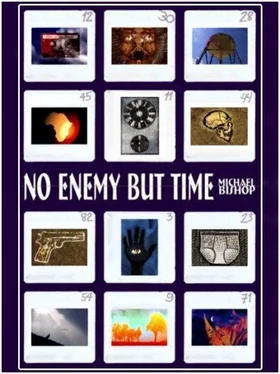* * *
Inside, Joshua took up a position against the auditorium’s eastern wall. His heart was pounding. Blair and his companions had probably believed him a political activist, possibly one of the opponents of the controversial arrangement whereby the United States had funded, built, and acquired access to a pair of modern military facilities on Zarakali soil, a naval base at Bravanumbi on the Indian Ocean, and an air base in the desert interior. Global politics was not on Joshua’s mind, however; he wanted to survive the evening and exchange a few words in private with the paleontologist. He was beginning to be sorry that he had not taken the time to change clothes and eat. Most of those in the metal folding chairs on the auditorium’s hardwood floor—during the school year, a basketball court—were either pointedly ignoring him or trying to figure out where he had stowed his broom.
Eventually, Blair, the Air Force colonel, and several other people filed onto the stage, and an official with the American Geographic Foundation—an attractive woman in a multicolored summer dress—took the lectern to introduce the Great Man, who stared at his knees or whispered with the colonel throughout her remarks. When she had concluded, the audience applauded warmly and Blair sauntered forward with outstretched arms and an engaging smile. He was in his early seventies, but still vigorous, still a glutton for adulation and work. The stage had been carefully set before his arrival, with props and portable movie screen, and he stalked back and forth along its apron as he reeled off an informal prologue to his program.
For better than twenty minutes, his bald pate shining, his mustachios sweat-dampened and bedraggled, Blair held forth on the differences between his assessments of recent African finds and the assessments of his chief on-the-scene rivals in paleoanthropological research, the Leakeys of Kenya. He and the Leakeys were good friends, he confided, but he liked to rib them for their excesses of enthusiasm. They liked to rib him, too. Blair and the Leakeys were members of one big, opinionated, and diverse family: the clan of hominid paleontologists.
“Although some of our colleagues in other fields have violently disputed the fact, hominid paleontologists are likewise members of another important family. Homo sapiens it’s called.”
This drew a laugh. Joshua laughed along with everybody else, and Blair, encouraged, moved on to the next segment of his performance. The highlight of this segment was an eloquent apostrophe to a plaster replica of the skull of a hominid that Blair, amid much controversy, had named Homo zarakalensis . He had discovered the original of this skull two years ago in his Kiboko digs, and his frequently ridiculed claim was that Homo zarakalensis , or Zarakali Man, represented a distinct form of hominid immediately ancestral to Homo erectus , the form that had mutated gradually into the first bona-fide representatives of Homo sapiens . In other words, Zarakali Man, an ancient inhabitant of Blair’s own country, was the earliest hominid deserving the unscientific description “human.” The Leakeys believed that H. zarakalensis —a term that Richard invariably placed in quotes as well as italics—actually belonged to the species already known as Homo habilis . Indeed, Richard Leakey had argued persuasively that Blair had created an entire species out of a shattered cranium, a jigger of Irish whiskey, and a dash of Zarakali chauvinism. If so, Blair was hardly the first. Paleoanthropologists were congenitally media-oriented.
Now, like Hamlet in the churchyard scene, Blair was flourishing a plaster-of-Paris death’s-head and addressing it feelingly:
“Alas, poor Richard!
Thy skull has lain enearth’d
three million years,
And several trifling centuries besides.
Thou wast a fellow of finite braininess,
But sufficiently sharp to
o’ershadow quite
The brilliant Leakeys’
well-beloved habilis ,
Whom we now perceive to have
been a jilt,
And no thoughtful precursor
of ourselves,
No germ for genius, no model
for Rodin—
But merely, this habilis , an upright ape
Of the australopithecine kind.”
The Great Man paused, stared into the vacant sockets of the skull, and then began to declaim again, his deep bass voice resonating in the old auditorium like the singing of the sea:
“O Richard, Richard, thou
numbskull namesake
Of my late lamented colleague’s
single-minded son,
Thou hast shaken from our
shaken family tree
Not only habilines but southern apes
Of both the robust and the gracile sorts.
And though an ape by any other name
Must needs make a monkey of
our nomenclature,
I here proclaim thee, chopfallen Richard,
By which I mean this skull and
not thy brother
Leakey of the Koobi Fora lava beds,
Our foremost father in the man-ape line,
Preceding H. erectus on the upswing
To our sapient selves. Alas,
poor Richard!
Habilis is deposed as well as dead!
In the long-lived, bony ruins of this
cold brainbox,
Long live the successor, Zarakali Man!”
Showmanship. Even though this pseudo-Shakespearean rant could not have made perfect sense to everyone there, it inspired intermittent laughter and finally a cascade of applause.
Blair kissed the skull on its brow, replaced it tenderly on the table from which he had first picked it up, and signaled for the dousing of the auditorium’s lights. He then narrated a colorful and comprehensive slide program interspersing panoramic shots of the Lake Kiboko digs with close-ups of recent fossil discoveries, the native wildlife, and many of his assistants at the site. He confessed that much of the work at even a fruitful paleoanthropological site was downright boring, and that he was not one of those people who actively enjoyed roaming the lava beds in temperatures of 102°F. In addition, he no longer had the patience for the painstaking work of cleaning a fossil discovery still perilously in situ . Younger hands were steadier than his.
Next—something Joshua had not expected—a series of slides devoted to the paintings of a prominent Zarakali artist’s fastidious reconstructions of Pleistocene animals. Despite the heat, Joshua began to shiver. It was strange realizing that this artist, working from bone fragments and imaginative taxidermal hunch, had attempted to objectify the persistent subject matter of his dreams. How accurately had she accomplished the task? Indeed, had she accomplished it at all? Joshua was the only one on hand, not excepting Alistair Patrick Blair, who would be able to tell.
“First slide, please.”
There jumped onto the screen a fanciful genus of sheep or buffalo called Pelorovis olduvaiensis . It had enormous curling horns that measured, according to Blair, ten feet from tip to tip. Joshua had read about this animal, but he had never encountered it during his recurring thalamic jaunts into the Pleistocene and so could reach no conclusion about the accuracy of its depiction. He felt lightheaded, though, as if he had surrendered the burden of those horns to the creature in the painting.
“Next slide.”
This one was Hippopotamus gorgops , with its projecting brow ridges and periscopic eyes. Joshua recognized it from his dreams, and the artist had expertly rendered the goggle-eyed strabismus typical of this hippo’s entire clan.
More slides followed. Giraffes with headgear reminiscent of the antlers of North American moose. Giant baboons, giant warthogs, giant hyenas. Primitive elephants known as Dinotherium , with abbreviated trunks and backward-curving tusks. If the paintings of these animals fell short of total accuracy—and sometimes they did—they usually failed by misrepresenting some aspect of the skin or fur: color, texture, markings, length. Wholly understandable errors. All in all, Joshua was astonished by the artist’s clairvoyance.
Читать дальше



![Ally Carter - [Gallagher Girls 01] I'd Tell You I Love You But Then I'd Have to Kill You](/books/262179/ally-carter-gallagher-girls-01-i-d-tell-you-i-lo-thumb.webp)








